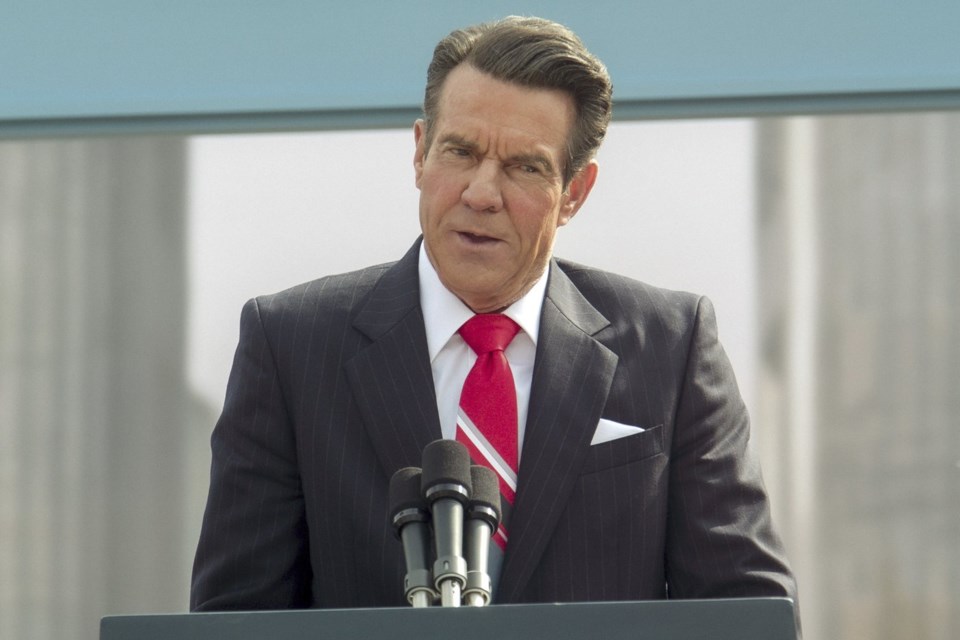“Is there anything worse than an actor with a cause?” asks an annoyed Jane Wyman, Ronald Reagan’s first wife, early in the new biopic starring Dennis Quaid.
Well, after watching two more hours of this story, an adoring look back at the man who served two terms as our 40th president, we can report that there is definitely one thing worse: An actor without a movie.
Let’s not blame the star, though. Quaid, who has played more than one president, has certainly got the charismatic grin, the pomaded hair and especially that distinctive, folksy voice down — close your eyes, and it sounds VERY familiar. If he were to appear on “Saturday Night Live” in the role, it would feel like a casting coup akin to Larry David as Bernie Sanders.
But this is not an “SNL” skit, despite the fact that Jon Voight appears throughout with a heavy Russian accent as a KGB spy, but we’ll get to that. This is a 135-minute film that demands a lot more depth. And, so, to co-opt a political phrase from Bill Clinton, whom Quaid also has played: It’s the script, stupid.
Lovingly directed by Sean McNamara with a screenplay by Howard Klausner, “Reagan” begins with a chilling event (and a parallel to a recent one): the assassination attempt on Reagan in Washington in March 1981, only two months after he became president.
There are those who say Reagan cemented his relationship with the public by surviving that attempt; he famously told wife Nancy from his bed: “Honey, I forgot to duck.” In any case, the filmmakers use the event to set up their story, and will return to it later on, chronologically.
But their early point is that Reagan came away from the scare with a divine plan. “My mother used to say that everything in life happens for a reason, even the most disheartening setbacks,” he says. And as he will tell Tip O’Neill, the House speaker, everything from then on will be part of that divine plan.
The yet broader point here is that Reagan, according to this film, was basically solely responsible for the eventual downfall of the Soviet Union, because he showed the people of the world what freedom meant. “I knew that he was the one,” says Viktor Petrovich, the retired spy played by Voight as a narrator figure throughout — meaning the one who would bring it all down. The script is based on Paul Kengor’s “The Crusader: Ronald Reagan and the Fall of Communism,” and Kengor has said Viktor is based on a number of KGB agents and analysts who tracked Reagan for years.
That point is made early and often. The rest is a history reel, with lots of glorious, loving lighting around our star. We go back to his younger years, learning about his mother and what she taught him about faith, and then his Hollywood years as an actor, Screen Actors Guild president (and a Democrat) before fully committing to politics, and the GOP.
We also see a newly divorced Reagan meet a winsome Nancy Davis, who will become his second wife, loving partner and constant companion. Like Quaid, Penelope Ann Miller is a perfectly fine actor who has little nuance to work with here. Together, they embark on the path to political stardom, starting with the California governorship. When they arrive at a neighbor’s home to campaign, the housewife at the door hears Reagan's “RR” initials and thinks he's Roy Rogers.
But a decade and change later, Reagan is sworn in as president, beginning his eight years in office. “It became my obsession to understand what was beneath the facade,” says Voight’s Petrovich, explaining why Reagan was so consequential.
Maybe, then, he could let us know?
Because when this movie ends, with the president’s death in 2004 a decade after announcing he had Alzheimer’s disease, we don’t know a lot more than when we began about a figure so influential in American politics.
Sure, we get all the great hits. ”Mr. Gorbachev, tear down this wall!” we see him say in 1987 in Berlin, a scene with much buildup.
And it’s fun to see the famous debate lines, like “There you go again,” to Jimmy Carter in 1980, and of course his famously deft deflection of the age issue in 1984, with Walter Mondale. “I will not make age an issue of this campaign,” the 73-year-old president told his questioner. “I am not going to exploit for political purposes my opponent’s youth and inexperience.”
The line, which made Mondale himself laugh, got Reagan back on track in the race. The movie, not so much.
“History is never about when, why, how — it always comes down to ‘who,’” says Voight’s Petrovich. However historians feel about that, we would have gladly taken a more incisive look at when, why, how or anything else that would give us real insight, instead of an extended and glowing commercial, into who this man really was.
‚ġ˱≤π≤µ≤π≤‘,‚Äù a Showbiz Direct release, has been rated PG-13 by the Motion Picture Association ‚Äúfor violent content and smoking.‚Äù Running time: 135 minutes. One and a half stars out of four.
Jocelyn Noveck, The Associated Press



